- Home
- Christie Golden
The Farther Shore Page 3
The Farther Shore Read online
Page 3
Libby made a wry face. “Usually,” she said.
“I’ll get right to the point. Why did you meet with Trevor Blake last night?”
Libby blinked, surprised. She had no idea Covington watched her people that closely. “I heard Admiral Montgomery mention Trevor’s name in your conversation and I thought I’d see if he knew anything that could help us ID Montgomery as the mole.” She took a breath and was about to tell Covington what she’d found buried inside the Royal Protocol document, but Covington spoke first.
“He’s a dead end. Anything he knows about Montgomery is at least four years old. Don’t contact him again, it’s a waste of your time. I’m sending over some more documentation on Montgomery that will be much more helpful in your search, I trust.”
Libby’s stomach clenched. Of course. She’d been so tired, her brain had been too sluggish to put the pieces together. Trevor Blake didn’t have the drive to have done his…research…on his own. He was a man who acted on orders.
And he was on orders from Brenna Covington.
“Agent Webber?”
Libby licked lips suddenly gone dry and reached for the skills that had saved her life before. She laughed easily.
“You don’t have to tell me twice, ma’am. Trevor Blake is a nice enough fellow, but let me put it this way—it was a long evening!”
Almost imperceptibly, Covington’s face relaxed, further confirming Libby’s fears. “I thought as much,” she said, and chuckled. They smiled at one another as if they were two girlfriends sharing boy talk. It almost made Libby sick.
“You look a little tired, Agent Webber.”
“I am,” she said. “I’ve been up all night reading reports.”
“Take a break before you start on the next batch,” said Covington. “Better to be sharp.”
“Understood. Is there anything else?”
“Just keep up the good work. Covington out.” Her image disappeared and Libby sagged in her chair.
Never in her life had she felt more alone or lost, not even when Voyager was reported missing. She had just uncovered some terrifying information and discovered that her boss was up to her neck in it. Someone had to know about this, try to stop it. But who could she trust?
Chapter 3
CAPTAIN JEAN -LUC PICARD looked as startled as Admiral Kathryn Janeway had ever seen him.
“This is highly irregular, Admiral.”
“I realize that,” said Janeway, “and because it’s so irregular, I insist you call me Kathryn.”
A flicker of mirth briefly curved Picard’s lips. “Usually requests of this sort come through the proper channels of Starfleet Command. May I ask why you chose not to pursue that venue?”
“Because Starfleet Command would want to know why, and if I told them, they’d say no.” She shrugged. “Simple as that.”
Picard chuckled. “Despite your protestations, I’d say your time in the Delta Quadrant has given you a touch of the renegade. Can you tell me why?”
She hesitated. “You have to promise me that if you deny my request—hell, even if you agree to it—you won’t tell Starfleet Command my reasons.”
He frowned. “I don’t like where this conversation is going.” He thought it over, then nodded. “Very well. You have my word.”
“Commander Data is an android. It was acknowledged in a court of law on stardate 42523.7 that he be granted the full rights of any human being in the eyes of the Federation, even though he’s not even made of flesh and blood.” She leaned forward into the screen. “I want those same rights granted to my friend the Doctor.”
“I can certainly sympathize with your feelings,” said Picard, “but it’s my understanding that the hologram is suspected of crimes that have led to the deaths of eight people.”
“He hasn’t even been read his rights!” Janeway snapped. “He was arrested on no charge, is being held on no charge, and is probably going to be deprogrammed or worse simply because Starfleet can do it. You didn’t stand by and watch Data be dismantled because he was viewed as Starfleet property. Do you expect me to do anything less for one of my people?”
Picard sighed. “No, I don’t,” he said. “It’s not for us to decide if he was or wasn’t involved. He should have the same right to trial that every Federation citizen has.”
The sense of relief that washed over every person in the room was almost palpable. Janeway smiled. “Thank you, Jean-Luc. I won’t forget this.”
“Don’t thank me, thank Commander Data, providing he agrees. I’ll recommend that he assist you, but of course, you realize that in the end, it’s his decision, not mine.”
“As a person, as an individual, he has the right to make his own decisions. Of course I understand. When can I expect to hear from him?”
“Not as soon as you would probably prefer,” he said, and the smiles around the room faded somewhat. “There are certain duties he needs to perform before I can permit him to take a leave of absence. We’ll be in touch.” He hesitated, then added, “I wish you the best of luck. And if there’s anything more I can do, please ask.”
“Again, thank you.”
He smiled, briefly. “Picard out.”
Janeway sighed and sat back in the chair. “Well, we’ve done what we can,” she said.
“That’s it? Data will contact us when he gets around to it?” asked Lieutenant Commander Tom Paris. He looked strange to Janeway without his daughter in his arms. Ever since he had been brought in for questioning, as they all had been a few days ago, Miral had been in her grandparent’s care. Not having her to worry about seemed to have given Tom a headstrong, dangerous edge. Janeway hadn’t realized to what extent marriage and fatherhood had tempered Paris.
“For now, yes, Mr. Paris,” she said. She had deliberately used his last name and there was a warning note in her voice.
“I can’t believe this is even happening in the first place,” blurted Kim. He’d been sitting quietly and this outburst surprised Janeway. “We shouldn’t have to be begging favors like this. They’re imprisoning innocent people and holding them like—like they’re animals. They’re grilling us to death and not letting us help, which we could do if they’d just realize it.”
Gently, Janeway said, “The Borg are so familiar to us, they’re like old friends.” She wrinkled her nose and amended. “Perhaps more like old enemies. We know them in a way Starfleet, indeed no one who wasn’t on Voyager, can understand. We’ve lost a lot of our fear of them out of necessity. I think we’ve forgotten just how terrifying they are. Seven and Icheb are like family to all of us. I look at them and I don’t even see their implants anymore. But that’s all that Starfleet could see when this new virus started cropping up, and I suppose we can’t blame them.”
“I had hoped for better from an institution that preaches compassion and tolerance for differences,” said Chakotay. “Icheb was beaten by his own classmates.”
Tuvok looked up sharply, and if Janeway didn’t know better, she could have sworn she saw righteous anger in his dark eyes. “Rest assured, Commander, that will be addressed. All of those who participated have been suspended. It is likely they will be expelled.”
“If they weren’t kids, I’d like to bloody a nose myself,” said Tom.
“That’s enough of that line of talk!” Janeway snapped. “There’s a holographic uprising that was clearly inspired by the Doctor. Starfleet is right to assume he had at least a modicum of involvement. There’s a Borg virus spreading across the Earth coinciding with our arrival home. Starfleet is right to investigate to see if there’s any connection. It’s how they’re going about it that I don’t like. We’ll do what we can, but we are all sworn Starfleet officers. Now. We’ll just have to see if Data is willing to help us, and wait until he arrives. If we have him on our side in time, that’s a huge step forward.”
“And if we don’t?” asked Chakotay.
For just a fraction of an instant, she hesitated. What would they do? She didn’t know. There had been many mome
nts like this in her life, where she had absolutely no idea what to do next. But one thing she did know was that eventually, solutions would present themselves if she trusted that they’d come.
“We think of something else,” she said simply.
• • •
It was late—or early, depending how you looked at it—when Harry Kim returned to his apartment. He wanted badly to talk to Libby, but she had been asleep for hours at this point. He was angry and frustrated. He felt helpless to do anything useful, and it chafed.
He and Tom had returned to Tom’s apartment for a while, talking, after Janeway had dismissed them. They’d said a few dark things he supposed they didn’t really mean about “Data’s duties” and drunk a beer or two, then Harry had said goodnight. Tom looked as though he didn’t want Harry to leave, and Harry supposed he knew why. Without Miral or the Doctor in the apartment, the place felt dreadfully empty.
He was surprised to see a light blinking on his computer at this hour. Probably Tom, he thought. “Computer, play message,” he said, shrugging out of his shirt.
He was surprised when no image appeared on the screen, and he heard no voice. For a moment, he thought that his computer must be damaged, but then he saw the old-fashioned text scrolling across the page. The hairs on the back of his neck prickled as he read.
You will not be able to trace this message so please do not try. I am a friend. I am sending you this missive to warn you about a threat to humanity itself. There is a Borg virus spreading across the globe. Starfleet is attempting to keep this quiet so as not to cause widespread panic, but certain people in the Federation itself are responsible for the virus. There is a conspiracy. You must take steps, but as secretly as you can. Be safe.
Kim didn’t try to trace it. Any message sent in this fashion would be so heavily encrypted that it would be virtually impossible to trace. He also that knew that only a handful of people had been briefed about the Borg virus, so whoever his mysterious contact was, he was for real. He couldn’t believe that the Federation itself was involved, though. Why? How? Who?
He downloaded the data onto a padd and contacted Janeway. When he read her the message, he could see the color literally drain from her face. In a detached part of his brain, he marveled at the image; he’d always thought that a cliché.
“Thank you for that information, Mr. Kim. Do you have any idea who this person or persons might be, and why they decided to contact you?”
“Not at all, Admiral. The statement ‘I am a friend’ can’t be literal. I don’t know anyone who’d have connections like that.”
Janeway leaned back in her chair and rubbed at her tired eyes. “I wonder what steps your friend expects us to take. In case you haven’t noticed, we’re somewhat persona non grata these days.” The last words were harsher than Harry might have expected from her, but he thought he understood.
Janeway had worked so hard to bring them all home, and she had mostly succeeded. A few friends had fallen in the Delta Quadrant, but Janeway had gotten her ship and most of its crew back where they belonged. Except it felt as though they didn’t belong. The Quadrant had moved on without them, thank you very much, and Kim felt left behind, left out, more than anything. The only real notice they’d attracted had been as suspects.
“Admiral,” he said, “You’ve got to get Data on our side. Starfleet can’t keep excluding us. And by us I mean the Doctor and Seven and Icheb. Especially if what this person is saying is true, that there’s a conspiracy involving the appearance of Borg on Earth.”
“This whole thing could be some kind of elaborate setup, Harry,” said Janeway. “You do realize that?”
“I do. But what if it’s true? Can we afford to just ignore it?”
Janeway shook her head. “No, we can’t. If there’s anyone who’d be angrier that someone in Starfleet was actually helping the Borg assimilate Earth more than myself or my crew, it’s Picard. Don’t mention this to anyone, Harry, not even anyone else from Voyager until I tell you. That’s an order.”
Oddly, Harry smiled. It was good to hear Janeway giving him an order again.
“Aye, ma’am,” he said.
• • •
The nights were the hardest, Seven thought.
The people who guarded them dimmed the lights, as if any of the three prisoners would be able to sleep. Things quieted down, and Seven’s body screamed louder for regeneration than at any other time. During the day, she could force her exhaustion away. She had visits to Dr. Kaz to keep her mind occupied; they were daily now, sometimes two or three times a day, depending on well or how badly her body was handling the situation. There was the occasional visit, too, from Janeway, Chakotay, and Tuvok to divert her. The Doctor did his best to keep them entertained, but the constant strain was affecting even the hologram.
But at night, all efforts at pretense were revealed as the hopeless straws they were. Conversation wound down and they all sat silently in their cells, the hologram and the two former Borg. Seven and Icheb would close their eyes and lie down upon their beds. Even if they could not sleep as normal humans did, even if they could not regenerate as the Borg needed to, they had been told by both the Doctor and Kaz that simply resting the body and trying to quiet the mind would help. At least a little, Kaz had told her, looking miserable. And “little” was the operative word.
She wondered how long it would take before her body shut down completely. She had gone for several days before without regeneration, but that had been aboard Voyager, usually when there was some pressing emergency that, in her mind at least, required her to stay functional. But now there was nothing to divert her mind from gnawing at the same worry: How long would it last? Would they let Icheb regenerate when he collapsed into unconsciousness? Would they let her do so when she started raving like a madwoman?
She knew the signs to look for: increased appetite, a drop in body temperature, shakiness, headaches, increased pain sensitivity. She was experiencing all of these physical effects of total sleep deprivation, and the psychological effects—irritability, poor concentration, apathy, paranoia, among others—were also starting to manifest.
Icheb was suffering, too. Just today he’d told her that he was having perceptual disturbances and he’d had a long conversation with someone who wasn’t there. Seven knew that the Vulcan “interrogator” had “examined” Icheb, too, and wondered why they didn’t just let him go. He was just a boy. He’d only even been an active Borg for a little while.
She watched him as he lay on his pallet, longing to reach out and stroke his hair but afraid of waking him.
He made a soft, rumbling sound. She started to her feet immediately and was about to reach for him when the Doctor’s sharp whisper interrupted her.
“Don’t, Seven!”
She turned to look at him. “He may be choking!” she shot back, also in a whisper.
To her surprise, the Doctor smiled. “That’s not choking. That’s snoring.”
She continued to look at him blankly.
“Don’t you understand?” he said, still whispering. “He’s asleep. Icheb has fallen asleep.”
Seven turned back to stare at the boy. His chest was rising and falling rhythmically, and he kept making that soft noise.
“It’s not possible,” she said, more to herself than to the Doctor. “We cannot sleep as humans do. We must regenerate.”
“He’s younger than you, and was Borg for a much shorter time,” the Doctor reminded her. “I think he’s learned to…adapt to his new situation.”
Seven felt tears welling in her eyes. She tried to blink them back but they would not be stopped. They were tears of gratitude, of relief, and they poured down her face like a waterfall coursing down a mountainside.
“Thank you,” she whispered, to who or what she did not know. “Thank you.”
• • •
It had been a long night for Lieutenant Vassily Andropov. He’d been doing the graveyard shift for over six weeks now, and he still couldn’t get hi
s body to get used to it. He was not a night person and it was with reluctance that he agreed to do the shift at all. He hated materializing in his apartment as the sky was turning gray outside, and the birds were just starting their daily songs. Having to drink too much coffee during his shift simply to stay alert made him jittery, and it was hard for him to unwind when he did get home and have a chance to catch a few hours’ sleep. He was grateful that he lived alone. It would be nearly impossible to maintain a relationship with this maddening schedule. And he’d be so grouchy, no one would want to live with him.
Andropov never called for lights when he materialized at home. He wanted it as dark and easy on his eyes as possible. There was only the simplest of routines—appear in the bedroom, undress, and fall into bed. He sank down in his favorite chair and groaned with pleasure at the comfort of it. He was so tired. Well, he told himself, taking off his boots and yawning, it wouldn’t be for too much longer. He just had to soldier through a few more weeks and then—
Hands clamped down on his shoulders, holding him down in the chair. He cried out and tried to break free, but they were implacable and strong, like iron bands. A figure stepped in front of him.
“Lights,” called the stranger.
Andropov blinked a few times, then stared. “Oliver Baines,” he said, hoarsely.
Baines smiled. “Well, not really, but close enough. I’m a holographic version of Baines.”
Hologram? Impossible. Andropov’s apartment wasn’t fitted with holographic emitters. He couldn’t possibly—And then Vassily’s gaze fell to the small black rectangle at Baines’s feet. It was the size and shape of a briefcase, but with the swiftness of one trained to recognize a possible threat when he saw it, Andropov made the jump. It was a portable emitter. Even though such things didn’t exist, as far as he knew, that was what it had to be.
Andropov struggled with renewed energy. It was futile. The being behind him—another hologram, he guessed—held him firmly. Damn it, he was one of the top people at the corrections institute, his apartment was well protected, they ought not to have been able to get in here—

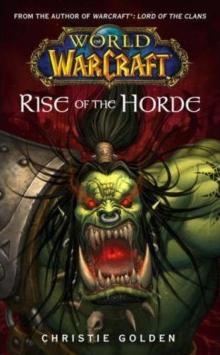 Rise of the Horde
Rise of the Horde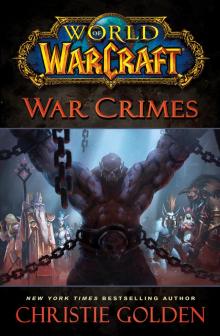 World of Warcraft: War Crimes
World of Warcraft: War Crimes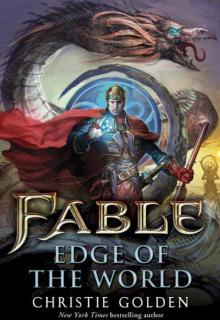 Fable: Edge of the World
Fable: Edge of the World Homecoming
Homecoming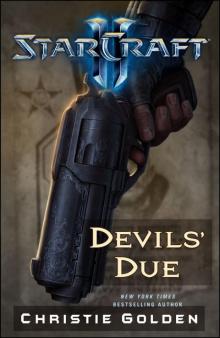 StarCraft II: Devil's Due
StarCraft II: Devil's Due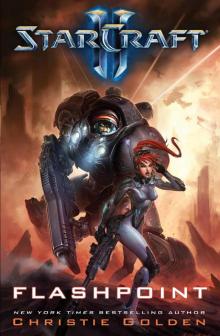 Starcraft II: Flashpoint
Starcraft II: Flashpoint Allies
Allies Shadow Hunters
Shadow Hunters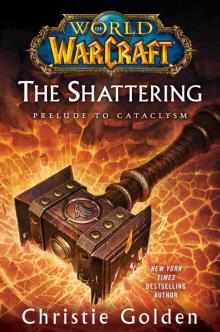 The Shattering: Prelude to Cataclysm wowct-1
The Shattering: Prelude to Cataclysm wowct-1 STAR TREK: VOY - Homecoming, Book Two - The Farther Shore
STAR TREK: VOY - Homecoming, Book Two - The Farther Shore King's Man and Thief
King's Man and Thief In Stone's Clasp
In Stone's Clasp Jaina Proudmoore: Tides of War
Jaina Proudmoore: Tides of War Vampire of the Mists
Vampire of the Mists Star Wars: Fate of the Jedi II: Omen
Star Wars: Fate of the Jedi II: Omen King's man and thief cov-2
King's man and thief cov-2 Star Trek
Star Trek StarCraft: Dark Templar: Twilight
StarCraft: Dark Templar: Twilight Lord Of The Clans
Lord Of The Clans ARKTIKA.1 (Short Story)
ARKTIKA.1 (Short Story)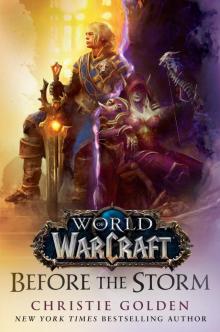 Before the Storm
Before the Storm STAR TREK: VOY - Homecoming, Book One
STAR TREK: VOY - Homecoming, Book One Shadow of Heaven
Shadow of Heaven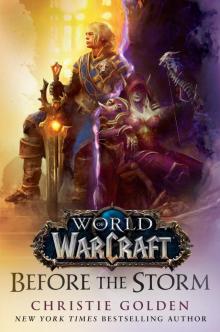 Before the Storm (World of Warcraft)
Before the Storm (World of Warcraft) Warcraft Official Movie Novelization
Warcraft Official Movie Novelization Flashpoint
Flashpoint STAR TREK: The Original Series - The Last Roundup
STAR TREK: The Original Series - The Last Roundup On Fire’s Wings
On Fire’s Wings Spirit Walk, Book One
Spirit Walk, Book One Thrall Twilight of the Aspects
Thrall Twilight of the Aspects Valerian and the City of a Thousand Planets
Valerian and the City of a Thousand Planets Warcraft
Warcraft Assassin's Creed: Heresy
Assassin's Creed: Heresy Dance of the Dead
Dance of the Dead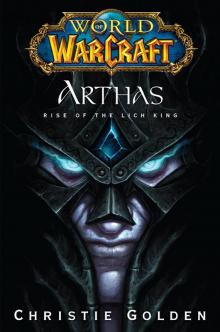 Arthas: Rise of the Lich King wow-6
Arthas: Rise of the Lich King wow-6 Assassin's Creed: The Official Movie Novelization
Assassin's Creed: The Official Movie Novelization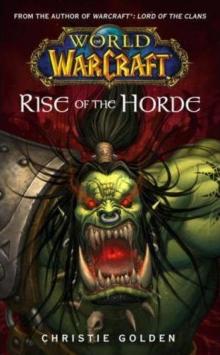 Rise of the Horde wow-2
Rise of the Horde wow-2 Dark Disciple
Dark Disciple Ghost Dance
Ghost Dance The Shattering
The Shattering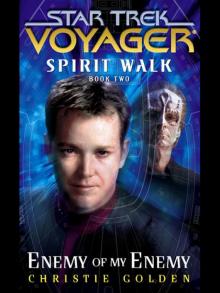 Spirit Walk, Book Two
Spirit Walk, Book Two Star Wars: Fate of the Jedi: Ascension
Star Wars: Fate of the Jedi: Ascension Star Wars: Fate of the Jedi V: Allies
Star Wars: Fate of the Jedi V: Allies The Enemy Within
The Enemy Within Kindred Spirits
Kindred Spirits The Farther Shore
The Farther Shore Star Trek: Hard Crash (Star Trek: Starfleet Corps of Engineers Book 3)
Star Trek: Hard Crash (Star Trek: Starfleet Corps of Engineers Book 3) Twilight
Twilight